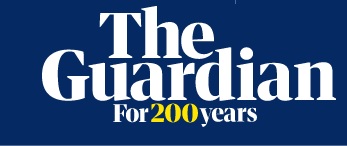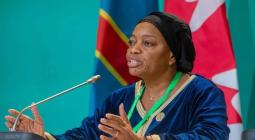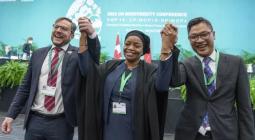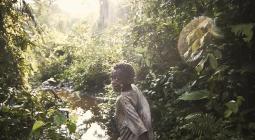Drama, dismay, triumph: nailbiting climax to the world’s biodiversity deal
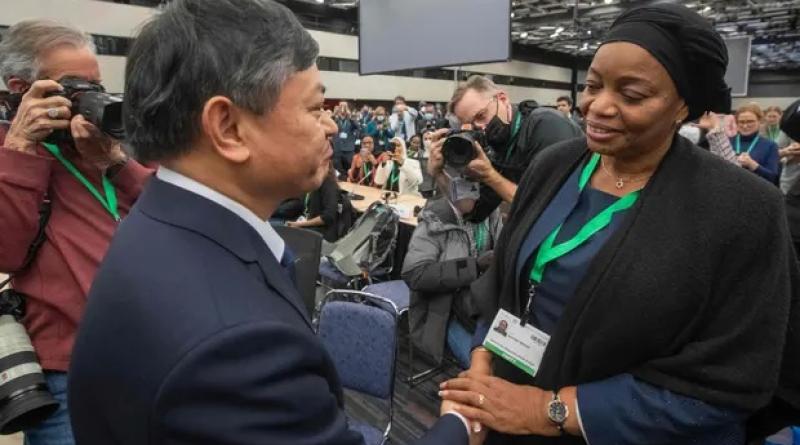
Long years of complex negotiations led up to one critical moment for the planet at Cop15 in Montreal this week. For a time, it seemed all was lost. Here’s what happened next…
Officially, this week’s deal to preserve Earth’s biodiversity passed at about 3.30am Eastern Standard Time on Monday 19 December, with a swift flick of the wrist from the Chinese Cop15 president, Huang Runqiu. But in spirit, the agreement was reached hours later – after frantic behind-the-scenes diplomatic efforts – with a symbolic apology.
Huang, China’s environment minister, hammered through the text to rapturous applause, the traditional sign that a deal has been reached in a UN process. Yet, moments before, the plenary heard clear dissent from the Democratic Republic of the Congo’s negotiator. Huang brought down the gavel anyway, seemingly ignoring the objection to the deal. He was challenged immediately. The negotiator from Cameroon called it “a fraud”, while Uganda said there had been a “coup d’état”.
In the confusion, legal advice was taken in the plenary hall. It was a done deal, the lawyer said. But this agreement is not legally binding – it relies on trust and credibility – and some developing states, especially those from Africa, felt their concerns had been dismissed and ignored.
“This will leave a bitter aftertaste,” said one negotiator on Monday morning. “The DRC has one of the largest rainforests in the world.”
In the aftermath, filing past dozens of snowmen built by Montreal police officers outside the Palais des congrès at first light, the mood in the early hours of Monday among many exhausted negotiators and UN staff was despondent.
A long time coming
Before Cop15, the four-year process to protect Earth’s habitability – amid warnings of the largest loss of life since the dinosaurs – had spluttered and stalled. It was stopped in its tracks in 2020 by Covid in what was meant to be the UN’s “super year” for nature, then restarted on Zoom calls and extra sessions in Geneva, Nairobi and Montreal. Warnings about the link between the destruction of nature and zoonotic diseases had pushed biodiversity up the international agenda during the pandemic.
The final agreement, when it came, was more than many had hoped for: ambitious targets on nature backed by big funding announcements, with respect for Indigenous rights and territories at its heart.
Calls to protect 30% of Earth by 2030, known as “30x30”, had been transformed into “30x30x30x30” in the final agreement by the Chinese presidency and David Cooper, second in command at the UN’s biodiversity convention, who helped draft the text: 30% protection and 30% restoration in exchange for $30bn of funding for conservation by 2030.
China’s debut at overseeing a major UN environmental agreement appeared to have been a success, a chance to show off “ecological civilisation”, key to Xi Jinping’s domestic agenda. With Canada’s Steven Guilbeault, a former environmental campaigner turned minister, China and Canada – squabbling adversaries – put their divisions aside for the good of the planet.
Guilbeault’s self-described “radical pragmatism” was on show throughout: he was quick to put out diplomatic fires and slow to take credit, also making sure the Canadian prime minister, Justin Trudeau, was an enthusiastic backer of Cop15. He took dozens of meetings, helping keep the peace between the global north and south, and still had time to show his son around the summit.
Huang, Guilbeault’s unlikely partner, had imposed order on division between the global north and south, and produced an ambitious text that genuinely plotted a middle course between competing demands after walkouts in the talks from the developing world over money during the final week of negotiations, supported by the incoming Brazilian president, Luiz Inácio Lula da Silva.
World leaders had not come to the summit, not formally invited by China to spare Xi’s blushes due to his own lack of attendance, it was reported. In the first week, talks had progressed slowly, with Greta Thunberg’s “blah, blah, blah” criticism of UN environment summits ringing true, according to some insiders.
Ahead of the arrival of ministers in the second week, one negotiator joked that there was so much division and lack of progress that “ministers are going to sack us all. At the moment, it’s a horror show.”
Slowly, momentum began to build. The actor James Cromwell provided a celebrity moment, urging the world to “stop the human asteroid” as he stood in front of a model dinosaur surrounded by pictures of world leaders’ heads as bits of rock flying into Earth.
Mounting tensions
Progress was quickly made with ministers, and on Sunday the agreement was listed for adoption at 7:30pm in the plenary hall. Unusually, it seemed a UN environment meeting would finish ahead of schedule.
Then the meeting was delayed for an hour. Then another. Hundreds of delegates waited for the historic moment, listening to upbeat music on loop. Seven hours after it was meant to start, signs emerged that it finally would.
Behind the scenes, there had been last-minute demands from the DRC’s environment minister, Ève Bazaiba, for more money for the developing world. DRC wanted a separate new fund for biodiversity but donor countries had dismissed the idea.
Bazaiba was not taking no for an answer. By the time the final plenary started, she was in bed, not present for the drama that was about to unfold. Her negotiator restated the DRC’s opposition, yet Huang passed the agreement – to the astonishment of many.
On Monday, when called by the Guardian at 5.30am for comment, Bazaiba, also the DRC’s deputy prime minster, said she needed a few more hours’ sleep. Officials fretted about what she would say when she woke up. Around noon, their fears were realised.
“We didn’t sign the agreement. It is not possible for us to implement it. We cannot accept the level of ambition without more finance,” she said, adding that the DRC would complain to the UN secretary general.
UN environment deals are agreed by consensus, and while this does not mean everyone has to agree, the decision to dismiss the DRC objection was unusual. The example of Nicaragua’s concerns about the Paris climate agreement being ignored by the French minister Laurent Fabius in 2015 during the final hours of negotiations was given as an example of precedent.
But Nicaragua was not a fair comparison. The DRC is a biodiversity superpower, home to the largest chunk of the world’s second-largest rainforest, in the Congo basin. The mountain gorillas of Virunga are world famous. If DRC was not on board with the agreement, it was the equivalent of China or India not supporting the Paris agreement.
There was scepticism among some about the DRC’s position. It was a holdout with an extreme position on money, they said, and Bazaiba had been angry about the involvement of Rwanda’s environment minister in resolving issues about finance as part of the final agreement, posting videos on Twitter calling it “an aggressor country” and “destroyer of biodiversity”, due to the ongoing conflict between the two. The DRC government is also auctioning oil and gas exploration licences in the rainforests it says it wants to protect.
Urgent diplomatic efforts were under way involving the US (there as an observer only), France, the UK and others to try to get the DRC on board, sources told the Guardian. A final plenary was scheduled for Monday evening, usually a procedural meeting after the agreement, and the clock was ticking.
If Bazaiba told the plenary that her country did not recognise the Kunming-Montreal deal, it would be a disaster.
Enter Indonesia and Brazil, new diplomatic partners with DRC in a rainforest big three – dubbed the “Opec for rainforests”. The Brazilian head of delegation, Leonardo Cleaver de Athayde, could be heard in a huddle on the plenary floor encouraging the DRC minister to soften her opposition. She was urged to express her disappointment about aspects of the deal but recognise it had passed. A coordinated apology would then follow with the Chinese.
Slowly, concerned faces among the rainforest “big three” turned to smiles. Once agreed, they posed together in front of the main stage. Now for Huang’s part of the bargain. Minutes later, he entered the hall and shook Bazaiba’s hand in an apparent symbolic apology, and the plenary hall burst into applause, with noticeable relief from senior UN officials.
The plenary began, and Huang gave Bazaiba the floor. She registered her concern with the deal, asking him to record the DRC’s objections in the final report, but – crucially – she acknowledged that it had passed. The tension, and the feeling that a special moment had been spoiled by some ugly diplomacy, had lifted.
‘Historic success’
At the closing press conference, UN environment head Inger Andersen urged citizens, businesses and governments to take immediate action on the agreement. Twelve years ago in Japan, a similarly ambitious deal was reached but not implemented. The test of the Kunming-Montreal pact will be who delivers this time on all aspects of the deal, from conservation to money.
There is genuine hope that this decade will be different, and Huang said he will use the next two years while he is still president of Cop15 to focus on implementation.
“The first few days of Cop15, the weather was not good,” he said. “It was cloudy. My heart was heavy. I felt a lot of pressure about what kind of agreement we could make. I need to thank Steven Guilbeault for his efforts.
“There is a Chinese saying that snow brings good luck. In the second week, it snowed. During the small hours of [Monday], we celebrated, applauded and cheered. In the conference, we achieved historic success,” he added, pausing to shake his Canadian counterpart’s hand.
Weeks after Xi publicly rebuked Trudeau at the G20 and a scandal over allegations that China interfered in Canada’s 2019 federal election, Cop15 might well have provoked some Christmas cheer between the two men, with a call rumoured to be taking place before Christmas, the Guardian understands.
Either way, the world has come together for action on the destruction of nature, and the true test now begins: to implement the deal.
Find more age of extinction coverage here, and follow biodiversity reporters Phoebe Weston and Patrick Greenfield on Twitter for all the latest news and features
cover photo: Sealing the deal: an all-important handshake between Cop15 president Huang Runqiu and the DRC’s Ève Bazaiba in Montreal on Monday. Photograph: Lars Hagberg/AFP/Getty Images

